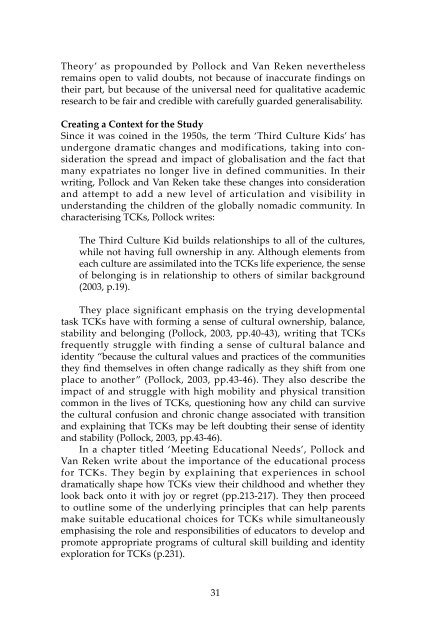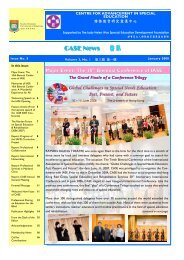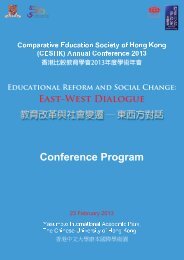Comparative Education Bulletin - Faculty of Education - The ...
Comparative Education Bulletin - Faculty of Education - The ...
Comparative Education Bulletin - Faculty of Education - The ...
Create successful ePaper yourself
Turn your PDF publications into a flip-book with our unique Google optimized e-Paper software.
<strong>The</strong>ory’ as propounded by Pollock and Van Reken nevertheless<br />
remains open to valid doubts, not because <strong>of</strong> inaccurate findings on<br />
their part, but because <strong>of</strong> the universal need for qualitative academic<br />
research to be fair and credible with carefully guarded generalisability.<br />
Creating a Context for the Study<br />
Since it was coined in the 1950s, the term ‘Third Culture Kids’ has<br />
undergone dramatic changes and modifications, taking into consideration<br />
the spread and impact <strong>of</strong> globalisation and the fact that<br />
many expatriates no longer live in defined communities. In their<br />
writing, Pollock and Van Reken take these changes into consideration<br />
and attempt to add a new level <strong>of</strong> articulation and visibility in<br />
understanding the children <strong>of</strong> the globally nomadic community. In<br />
characterising TCKs, Pollock writes:<br />
<strong>The</strong> Third Culture Kid builds relationships to all <strong>of</strong> the cultures,<br />
while not having full ownership in any. Although elements from<br />
each culture are assimilated into the TCKs life experience, the sense<br />
<strong>of</strong> belonging is in relationship to others <strong>of</strong> similar background<br />
(2003, p.19).<br />
<strong>The</strong>y place significant emphasis on the trying developmental<br />
task TCKs have with forming a sense <strong>of</strong> cultural ownership, balance,<br />
stability and belonging (Pollock, 2003, pp.40-43), writing that TCKs<br />
frequently struggle with finding a sense <strong>of</strong> cultural balance and<br />
identity “because the cultural values and practices <strong>of</strong> the communities<br />
they find themselves in <strong>of</strong>ten change radically as they shift from one<br />
place to another” (Pollock, 2003, pp.43-46). <strong>The</strong>y also describe the<br />
impact <strong>of</strong> and struggle with high mobility and physical transition<br />
common in the lives <strong>of</strong> TCKs, questioning how any child can survive<br />
the cultural confusion and chronic change associated with transition<br />
and explaining that TCKs may be left doubting their sense <strong>of</strong> identity<br />
and stability (Pollock, 2003, pp.43-46).<br />
In a chapter titled ‘Meeting <strong>Education</strong>al Needs’, Pollock and<br />
Van Reken write about the importance <strong>of</strong> the educational process<br />
for TCKs. <strong>The</strong>y begin by explaining that experiences in school<br />
dramatically shape how TCKs view their childhood and whether they<br />
look back onto it with joy or regret (pp.213-217). <strong>The</strong>y then proceed<br />
to outline some <strong>of</strong> the underlying principles that can help parents<br />
make suitable educational choices for TCKs while simultaneously<br />
emphasising the role and responsibilities <strong>of</strong> educators to develop and<br />
promote appropriate programs <strong>of</strong> cultural skill building and identity<br />
exploration for TCKs (p.231).<br />
31
















